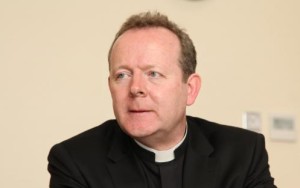
By Cian Molloy - 24 April, 2017
On Divine Mercy Sunday in Knock, the Archbishop of Armagh Eamon Martin yesterday prayed for ‘miracles of mercy’ for individuals, for Ireland and for the whole world.

Archbishop Eamon Martin
Recalling that Pope John Paul II’s last message to the faithful was read out on Divine Mercy Sunday 2005, the day after he died, Archbishop Martin quoted the pontifical saint: “Humanity sometimes seems bewildered and overwhelmed by the power of evil, selfishness, and fear; but as a gift to humanity, the Risen Lord offers His mercy, His love that pardons, reconciles, and reopens hearts to love. It is love that converts hearts and gives peace. How much the world needs to understand and accept Divine Mercy!”
Examples of where Divine Mercy is needed, according to the Archbishop, include the growing gap between rich and poor, where the eight richest people in the world have more wealth than the poorest half of the world’s population put together, and where those in the developed world waste food, water and other valuable resources while many others are dying of famine and malnutrition.
Calling for mercy “on us and on the whole world”, the Archbishop pointed to the erection of hard borders and walls while hundreds of thousands of migrants are travelling in search of shelter, food and peace, where greed has created a global market for human trafficking – a modern slave trade, and where many people across the world cannot read or write or are persecuted, exploited or deemed expendable.
In the last category, Archbishop Martin cited an Irish example – “the continued attempt to convince us that there’s nothing wrong with undermining the right to life of the unborn child”.
We are being encouraged to repeal, delete or amend Article 40.3.3 in our Constitution, Dr Martin said. “Demands to quash and abolish this amendment go against the Good News that the life of every person is sacred and inviolable, irrespective of the stage or state of that life – from the first moment of conception until the moment of natural death.
“This is the most fundamental of all moral principles. It is the basis upon which every human right we enjoy as persons is predicated and upon which our very freedom and dignity as a person rests. It admits of no exceptions. To deliberately and intentionally take the life of an innocent person, whatever their state or stage of life, is always gravely morally wrong.
“On this Divine Mercy Sunday let us pray for ‘miracles of mercy’ to happen in our own lives and in the lives of all we pray for at this Mass. Have mercy, on us, on our country, and on the whole world.
“Eternal Father have mercy on us and on the whole world for our spitefulness or anger, our wastefulness, our lack of respect for the dignity of others, for the dignity of life itself, our carelessness with our health, our failure to respect our own bodies and those of others as temples of the Holy Spirit.
“Pour your mercy into our hearts, into our homes, into our country and world at this time. Forgive us for the breakdown in family life, for domestic violence and abuse, for the sins and crimes that have been committed in the Church, for the prevalence of addiction, for the despair that leads to so much self-harm and suicide in our country and in our world. Thank you God for being rich in mercy; thank you God because your mercy endures forever!”
The Divine Mercy Devotion is inspired by the experiences of Saint Sr Faustina Kowalska, a Polish nun who experienced visions of Our Lord during the first half of the 20th century. The Feast of Divine Mercy was formally established by Pope Saint John Paul II in April 2000, the month in which Sr Faustina was canonised.
The prayer of St Faustina is as follows:
Help me, O Lord, that my eyes may be merciful, so that I may never suspect or judge from appearances, but look for what is beautiful in my neighbours’ souls and come to their rescue.
Help me, O Lord, that my ears may be merciful, so that I may give heed to my neighbours’ needs and not be indifferent to their pains and moanings.
Help me, O Lord, that my tongue may be merciful, so that I should never speak negatively of my neighbour, but have a word of comfort and forgiveness for all.
Help me, O Lord, that my hands may be merciful and filled with good deeds, so that I may do only good to my neighbours and take upon myself the more difficult and toilsome tasks.
Help me, O Lord, that my feet may be merciful, so that I may hurry to assist my neighbour, overcoming my own fatigue and weariness.
Help me, O Lord, that my heart may be merciful so that I myself may feel all the sufferings of my neighbour.